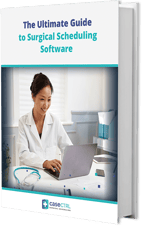Learn how to choose the right surgical scheduling software for your practice, what features to look for, and how to ensure the best ROI. 
Paper-based surgical scheduling processes or static EMR form-based scheduling can cause a host of problems. For example, according to research from Johns Hopkins, lost or misplaced consent forms alone cost hospitals approximately $580,000 per year. Forms are missing in 66% of surgeries, which delays 10% of surgical procedures. Back and forth between scheduler, patient, surgeon, equipment suppliers and others coordinating the surgery also present opportunities for miscommunication and productivity loss and are common pitfalls with siloed, paper-based scheduling processes.
Surgical practices are also being required to do more with less. Insurance companies keep increasing the requirements for secure surgery authorization. Many surgical practices are hampered by medical staffing shortages, increasing the administrative burden on existing staff. This can lead to communication issues with patients, referring physicians, insurance companies, and other parties.
Problems with managing surgery scheduling can also affect your practice’s bottom line. Improper booking or underutilization of block time can cost your operating room $62 per minute.
One solution is to replace outdated manual workflows with automated surgical scheduling software.
This ebook discusses the benefits of investing in an automated surgical scheduling solution. You’ll learn how the software can make better use of resources, improve patient safety, increase productivity, and create a better experience for patients and surgical staff.
Making your surgical practice more efficient and profitable requires making the move to automated surgical scheduling software. Our guide answers the most essential questions that help you to choose the right software solution, including:
- Why don't static EMR intake forms work in today’s surgical practices?
- What types of issues can surgical scheduling software help you to overcome?
- How can automating surgical scheduling help your practice to prevent revenue loss?
- How can surgical scheduling software protect your practice against compliance and safety risks?
- How does surgical scheduling software affect patient readiness, communications, and satisfaction?
- What key features should you look for when purchasing surgical scheduling software?
